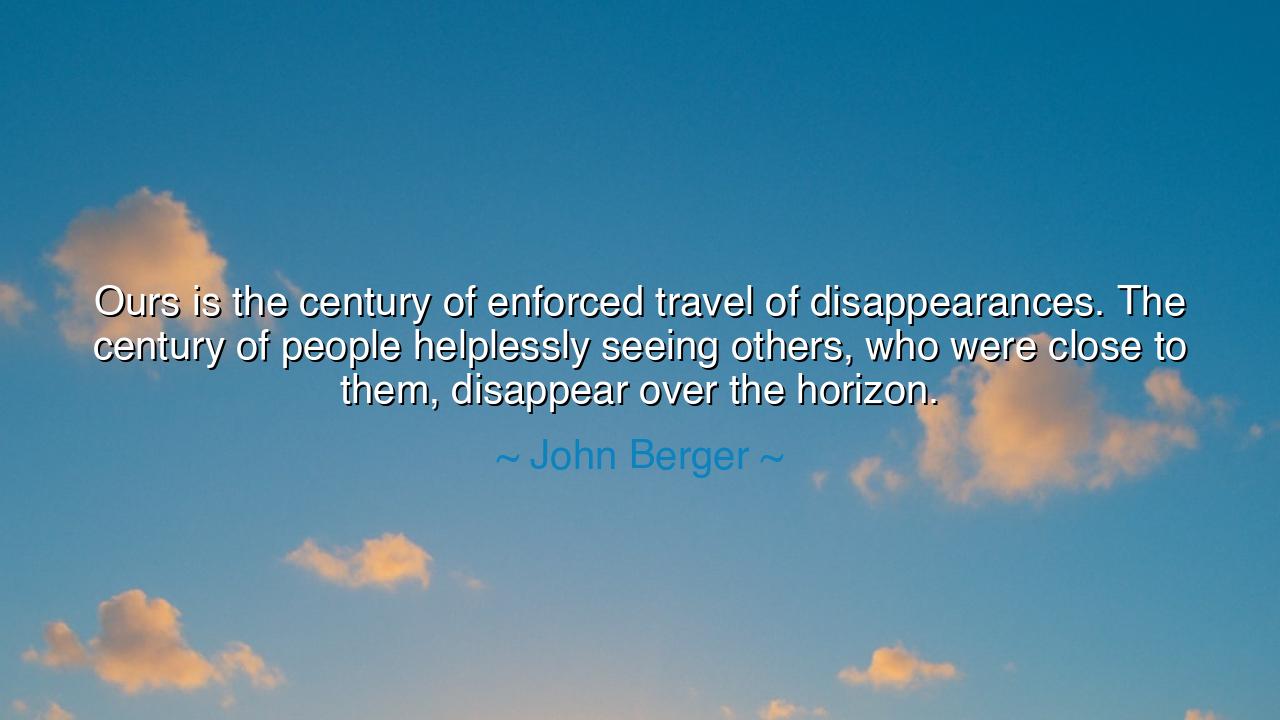
Ours is the century of enforced travel of disappearances. The
Ours is the century of enforced travel of disappearances. The century of people helplessly seeing others, who were close to them, disappear over the horizon.






John Berger, the seer of exile and witness of human sorrow, once declared: “Ours is the century of enforced travel, of disappearances. The century of people helplessly seeing others, who were close to them, disappear over the horizon.” These words are not light reflections; they are heavy with grief, heavy with the memory of wars, exiles, refugees, and broken homes. In this single sentence, Berger names the tragedy of an age where movement is not chosen but compelled, and where travel is not a joy but a wound.
The meaning strikes first at the word enforced travel. In earlier ages, journeys were often acts of pilgrimage, of conquest, of exploration, or of trade. But in the twentieth century—Berger’s century—millions traveled against their will. Wars pushed people from their homes. Dictatorships banished dissenters. Hunger drove families to distant lands. It was the age of the refugee camp, the death march, the migrant laborer. Travel, in its noblest sense, was corrupted, twisted into exile.
The second pillar of his lament is disappearances. To disappear is not simply to leave; it is to vanish into uncertainty, into silence, into the void where no farewell is possible. Throughout that century, countless were taken from their homes in the night—prisoners of war, victims of purges, deportees to gulags or camps. Others disappeared in the sea, attempting dangerous crossings. Others still disappeared into the anonymity of foreign cities, never to be seen again by those who loved them. Berger calls this the wound of helplessness: to watch a beloved fade into the horizon, powerless to call them back.
History abounds with examples that echo Berger’s cry. Think of the Armenian genocide, where families were torn apart on forced marches into the desert. Think of the Holocaust, where millions disappeared into camps, leaving only ashes and silence behind. Think of the countless refugees of wars in Spain, Vietnam, Bosnia, and beyond—faces pressed to train windows, families clutching one another as borders divided them forever. These are not isolated events but the pattern of a century where displacement became the defining scar.
And yet, even in this tragedy, there is a hidden strength. Those who endured enforced travel and exile carried with them their songs, their stories, their memories. They planted pieces of their lost homelands in new soil. Consider the Jewish diaspora, who though scattered across the earth, carried their traditions and language across generations. Or the exiled poets, like Pablo Neruda, who turned the pain of displacement into words that gave voice to millions. Though disappearances marked the century, so too did resilience.
The wisdom of Berger’s words lies in his warning: to ignore displacement is to ignore the suffering of our time. His century may have been one of disappearances, but ours continues with migrations driven by war, famine, and climate change. The helplessness of watching loved ones disappear has not ended; it repeats across borders every day. To acknowledge this is not despair—it is the beginning of compassion and responsibility.
Thus, the lesson we must take is this: do not take for granted the blessing of rootedness, of seeing those you love remain close. And when you encounter those who have been displaced, see them not as strangers but as bearers of stories, as exiles carrying heavy burdens. We must be builders of welcome, not watchers of disappearance. We must ensure that our century does not continue to be defined by exile, but by hospitality.
Practical counsel follows: open your eyes to the displaced around you. Offer help to refugees, listen to the stories of migrants, guard against indifference to enforced travel. And in your personal life, cherish the presence of those you love, for no one knows when they may pass over the horizon. For as Berger reminds us, the deepest sorrow is not only in leaving, but in helplessly watching those we love disappear while we remain behind.






AAdministratorAdministrator
Welcome, honored guests. Please leave a comment, we will respond soon